
The news headlines are bringing a modern issue to the public regarding the operation of skilled nursing homes – and that issue is the pairing of social media and the use of video cameras, known in the industry as “granny cameras.”
Residents and family members have reported elder neglect and abuse based on their view of what the camera sees. And yet, the use of granny cameras can have a positive effect on elder care, providing peace of mind and accountability. Like most technological advances, there are tradeoffs. If a nursing home is going to use granny cameras, owners and administrators must thoroughly discuss the legal and practical ramifications for either authorizing or prohibiting the use of the cameras.
The issue is polarizing. On one hand, family members of residents frequently champion the use of granny cameras for their ability to capture what is actually happening at the nursing home. On the other hand, healthcare providers often resist the use of this technology in their facilities, due to the risks involved, the policies required, and the implementation of the technology itself. While executives consider how granny cameras can be an effective tool for loved ones to monitor a resident, or to mitigate elder neglect and abuse, they must also explore the legal and practical considerations.
At least nine U.S. states have enacted statutes regarding the use of granny cameras. Approximately fifteen other states have proposed statutes or regulations but have not moved forward with implementation. The law is not consistent and sometimes does not even exist for many states. It is critical for a nursing home owner to know the status of the granny camera laws wherever they operate facilities, and to make the necessary adjustments to their staff and resident policies. In certain states, the nursing home is prohibited from banning the use of granny cameras, as long as the resident or family member adheres to certain guidelines.
While the law may not be crystal clear for every state, the use of granny cameras in the healthcare setting poses significant challenges as a result of other laws. For example, the Health Insurance Portability and Accountability Act (HIPAA) includes a privacy rule which prohibits healthcare providers from sharing health information without the written consent of the resident or of his authorized representative. To the extent that the granny camera transmits audio, its usage may result in a breach of the HIPAA privacy rule since people with access to the granny camera may not be authorized to receive confidential healthcare information. In addition, state and federal wiretapping laws may prohibit the audio recording of communications without the consent of either party to the communication. This poses the risk of criminal and civil penalties, to the extent that the communication is not authorized.
Granny cameras also raise other confidentiality concerns for nursing home facilities. The privacy of unsuspecting residents who are unaware that their loved ones may be watching them raises concerns, particularly as the video recording may be done surreptitiously and may capture changing, bathing or private communications. Issues may also arise as to who has the authority to permit the use of the granny camera, the resident or the family member, and if a family member, whether the healthcare proxy or power of attorney authorizes that decision. Notice of the potential use of cameras in the nursing home is also an important consideration as it relates to visitors, residents, residents who share rooms, and vendors. Signage may be required.
Executives at nursing homes must also consider how the use of recording devices can impact employee morale. Although employees in New Jersey, for example, have no specific rights with regard to the use of surveillance equipment, usage may affect their morale as they know they are being measured on their overall quality of care and communication. On the other hand, in California, the law contains specific notice requirements and restrictions on the use of video/audio recording devices.
Another administrative consideration is the cost of implementing the technology. Although the cost of the surveillance equipment will probably be the responsibility of the resident/family member, upgrades to the infrastructure of the facility may be required to set up the use of granny cameras. In addition, costs associated with the development of and training on granny camera policies must be considered. Moreover, the addition of surveillance equipment for a resident may require changes to room assignments, when one resident does not want to be recorded.
From a legal perspective, the position of the nursing home facility on the use of granny cameras must be clarified in resident agreements, employment handbooks, vendor agreements and additional facility policies. Another consideration about these policies is the perception they give to potential residents and family members who are looking at particular facilities. Because the issue is controversial, the nursing home’s policy on granny camera usage can impact the facility’s reputation and ability to market.
Skilled nursing homes should be prepared to adapt to the always evolving technology that can impact the operation of a facility, and the myriad issues surrounding the use of granny cameras requires thoughtful consideration. The risk of litigation must also be noted. At the least, policies for staff and residents either authorizing or prohibiting granny cameras in their facilities must be reviewed for clarity, updated if needed, implemented and adhered to via employee training.
Tim Ford is a Member of the Employment Law, Commercial Litigation and Closely Held Business Law Departments at Einhorn Harris in Denville, NJ. He can be reached at 973-627-7300 or [email protected].



